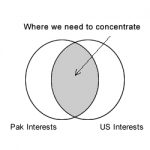The government has been loudly criticising drone strikes recently, and PM Gilani has said that “when drone attacks occur, militants and tribes unite”. But at the same time the government is also requesting the US to transfer drone technology to Pakistan. If drone attacks are so terrible, why do we want the weapons ourselves?
Perhaps we want the drone technology because it works.
Ustadh Ahmad Farooq, a leading al-Qaida propagandist in Pakistan, says in a new audio message that the terrorist network is “losing people” and “facing shortages of resources” in the area, thanks in large part to the escalated U.S. drone campaign. And he indicates the safe havens aren’t as safe as they once were.
“There were many areas where we once had freedom, but now they have been lost,” Farooq laments in a January 23 audio message obtained by the terror-trackers at the SITE Intelligence Group. “Our land is shrinking and drones are flying in the sky.”
Remember when Gen. Ghayur let slip that the drones were successfully killing militants?
General Officer Commanding 7-Division Maj-Gen Ghayur Mehmood said in a briefing here: “Myths and rumours about US predator strikes and the casualty figures are many, but it’s a reality that many of those being killed in these strikes are hardcore elements, a sizeable number of them foreigners.
“Yes there are a few civilian casualties in such precision strikes, but a majority of those eliminated are terrorists, including foreign terrorist elements.”
If the drones work, what are we complaining about? This was the conclusion of Dawn last month, and it makes sense.
Is the army hinting that the strikes are a useful and precise tactic in neutralising identified militants and terrorists? If that is the case, then the military and political leaders should publicly change their stated position and matters should move on — the battle against local and foreign terrorists hiding in the country`s north-western regions is far from over. Some of the social and political repercussions to which Maj-Gen Mehmood referred would be reduced if the drone strikes were acknowledged as an effective technique and thus legitimised in the public discourse. More importantly, if the army is recognising the utility of such strikes, greater cooperation between Pakistani and US forces could yield success in the long term.
Ostensibly the objection is due to sovereignty. But for all the talk of sovereignty and never letting foreign soldiers on our soil, there are reports of Chinese soldiers lining up on the LoC. And let’s be honest – if the US offered to post troops on the Eastern border facing their bayonets towards Delhi, would we object or rejoice? Part of the problem is that what we seem to want are two different things: We want the support and the resources of the American military, but we want to pretend that we don’t. As a result we are sending mixed messages to the US and to ourselves. Nadir Hassan noticed this in the latest ISI-CIA talks between Pasha and Panetta.
The army, for its part, knows that its complaints amount only to public posturing. We went through this whole charade with army opposition to the Kerry-Lugar Bill, where it was made clear that the army did not like being dictated to by the US. Yet it, and the country, ended up accepting the aid and the conditions attached to it and the issue is a forgotten one. As was the case then, the army’s main motive was to make its displeasure known domestically. This essentially boils down to the army trying to maintain its sense of self-pride by telling everyone that they know they have to accept American control but they certainly don’t like it. Everyone fretting about the US-Pakistan alliance should just keep that in mind and tone down the alarmism.
Perhaps the real wish of the military brass is a return to the way things were in the 1980s when the US sent money and weapons and left the ISI to manage the strategy on its own. The ‘Charlie Wilson’ way of cooperating. Maybe that would be best, but let’s be realistic – it’s not going to happen.
The other part of the problem is that the Americans want the support and resources of our own military, but they want to pretend like they don’t also. The Americans seem to wish that we would just open the door and let them run their own war within our borders. That’s not going to happen either.
 Right now we’re facing the awkward situation where we need the Americans and they need us also, but both sides are acting like we can do without the other. This is self-defeating. Our interests are not 100% same, but there is a lot of overlap and that is where we should be talking about how to work together. Shuja Nawaz says as much in a blog post released yesterday:
Right now we’re facing the awkward situation where we need the Americans and they need us also, but both sides are acting like we can do without the other. This is self-defeating. Our interests are not 100% same, but there is a lot of overlap and that is where we should be talking about how to work together. Shuja Nawaz says as much in a blog post released yesterday:
The Pakistani military and government do cooperate with the C.I.A. and U.S. military in the border region, but they will not acknowledge this openly. Both countries need to address their concerns frankly and in detail rather than continue a charade that misinforms their own people about what they are doing and why.
Each side needs to look at what are the realistic options and decide what is in the best interests of the effort to stop militants. That’s going to require some honest discussions and some difficult decisions for both sides.
![]()





